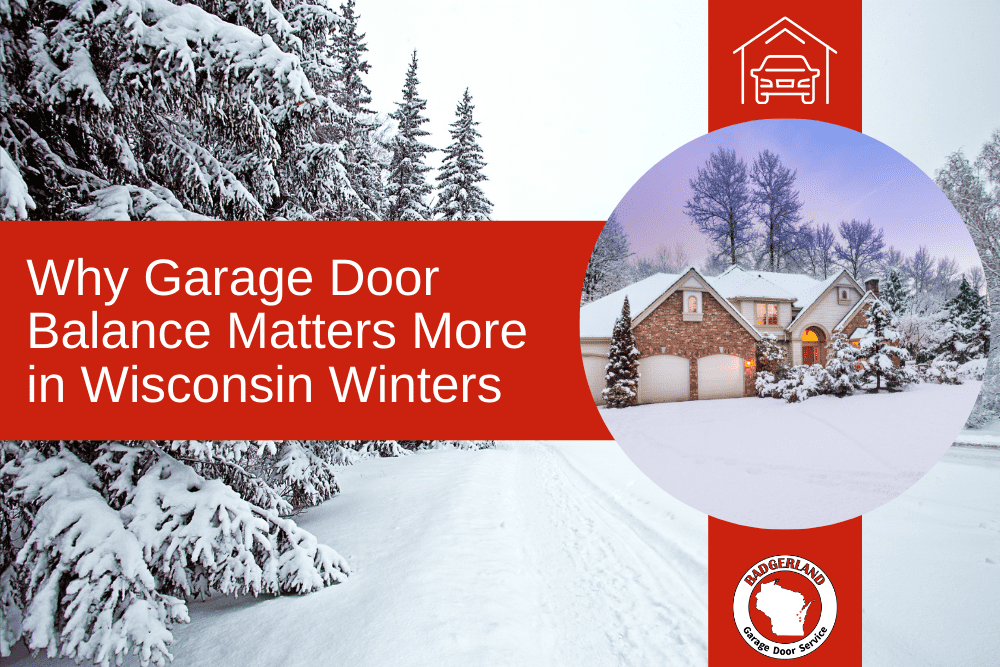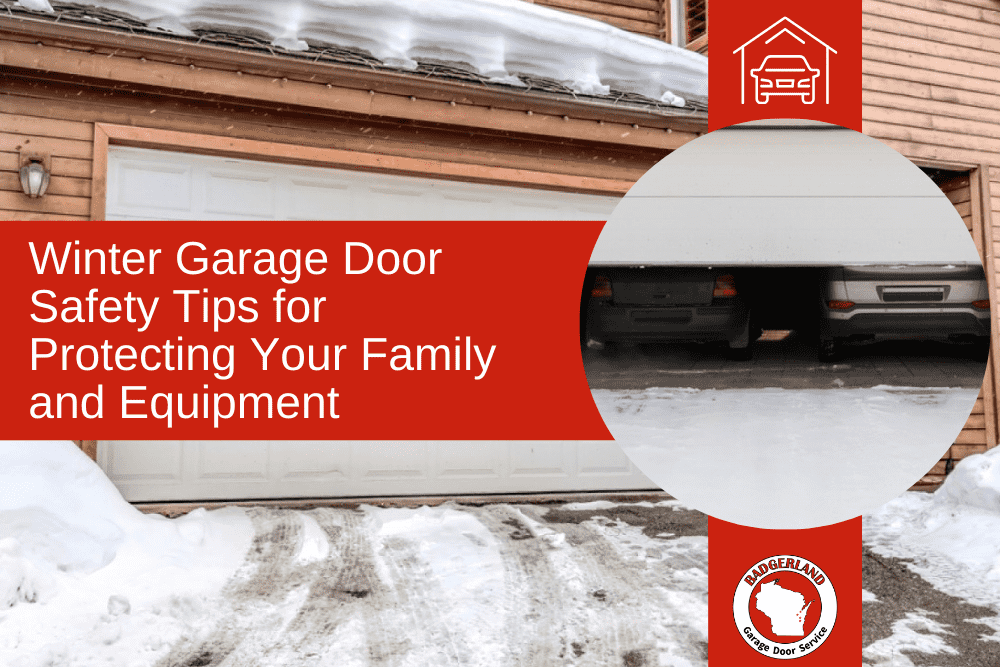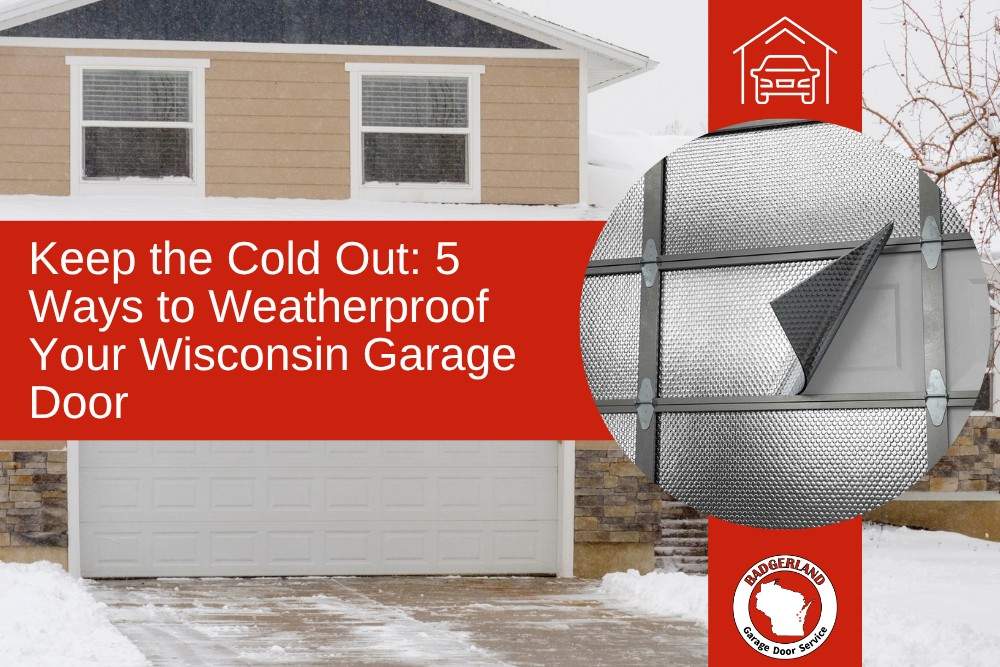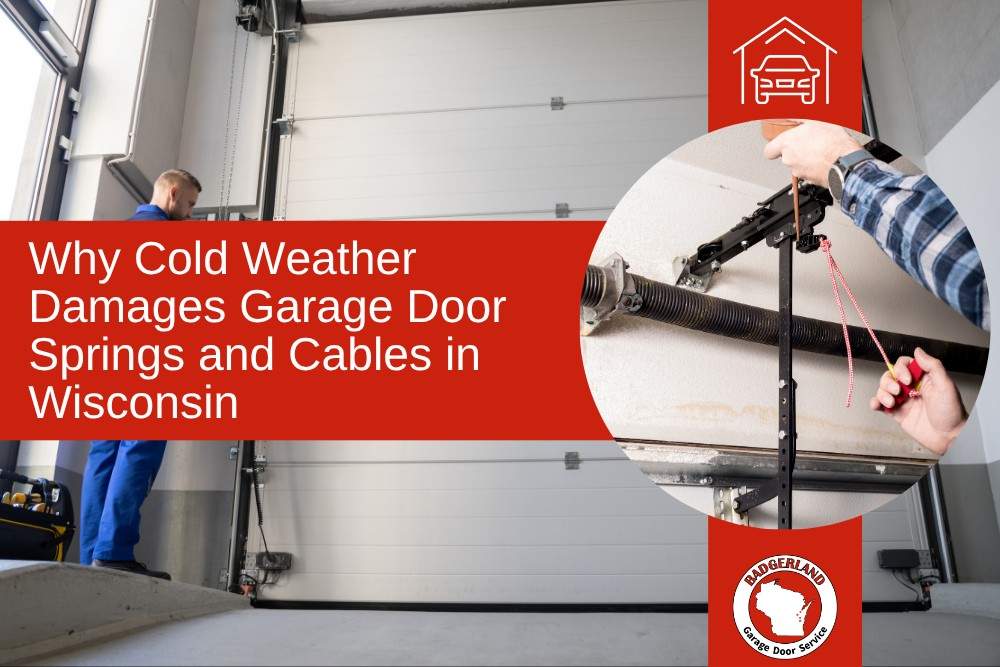
Table of Contents
Why Winter Weakens Garage Door Springs and Cables in Wisconsin
When temperatures drop across Green Bay, Appleton, Neenah, and De Pere, your garage door faces more than icy driveways and snow-covered tracks. The real challenge comes from the metal components, especially the springs and cables that work under constant tension to lift and lower your door safely. Cold weather puts extreme stress on these parts due to metal contraction, thermal expansion and contraction, and the way materials contract when exposed to cold temperature ranges.
As metal contraction occurs, lubricants thicken, and moisture freezes, even the smallest weakness can lead to a snapped spring or frayed cable. These changes are tied to the coefficient of thermal expansion, linear thermal expansion, and how steel reacts as a function of temperature. For Wisconsin homeowners, understanding how freezing temperatures affect your garage door and what preventive care to take can make the difference between smooth operation and an unexpected repair bill.
At Badgerland Garage Door Service, we help homeowners protect their doors before winter damage strikes. Here’s what every Wisconsin homeowner should know about cold weather’s impact on garage door springs and cables, including negative thermal expansion, linear expansion coefficients, and why metal contraction becomes more severe as components are heated or cooled beyond room temperature.
The Science Behind Metal Contraction and Spring Damage
Every garage door system relies on tension, balance, and flexibility. When the temperature drops, the metal used in your garage door’s springs and cables contracts through metal contraction caused by thermal expansion and contraction. This process occurs because materials contract as temperatures fall below normal room temperature, reducing elasticity and altering the original length of metal components.
Steel torsion springs that perform well across a wide range of temperatures can lose lifting strength when exposed to extreme cold due to changes in linear thermal expansion and stored kinetic energy. As the temperature ranges fluctuate, these forces place additional strain on your opener, increasing the likelihood of failure when an increase in temperature does not occur quickly enough to restore flexibility.
Cables experience similar stress. Cold air stiffens wire strands as metal contraction sets in, especially when moisture freezes overnight. When the system is heated or cooled, changes in linear expansion coefficients can cause cables to fray or snap unexpectedly.
Pro Tip: Keep your garage above freezing when possible. Even a small space heater or insulated door can reduce temperature swings and help protect springs and cables from contracting too quickly.
Regular garage door spring repair and cable inspections can identify these weak points before they cause costly breakdowns.
Common Winter Problems Affecting Springs and Cables
Once the temperature falls below freezing, several cold-weather factors begin to attack your garage door’s moving parts. These problems often develop quietly but can lead to sudden, expensive failures if not addressed early.
- Loss of Tension in Springs: Cold air reduces metal flexibility, making springs lose balance and strain the opener with each movement.
- Frozen or Stiff Cables: Moisture buildup can freeze around pulleys, causing cables to bind, fray, or unwind when the door operates.
- Thickened Lubricants: Standard lubricants can harden in freezing temperatures, adding resistance and stress to the entire system.
- Rust and Corrosion: Salt and humidity accelerate corrosion, making already brittle springs or cables more likely to snap under tension.
These factors rarely occur alone. They combine to wear down your system faster and make your garage door more vulnerable during Wisconsin’s coldest months.
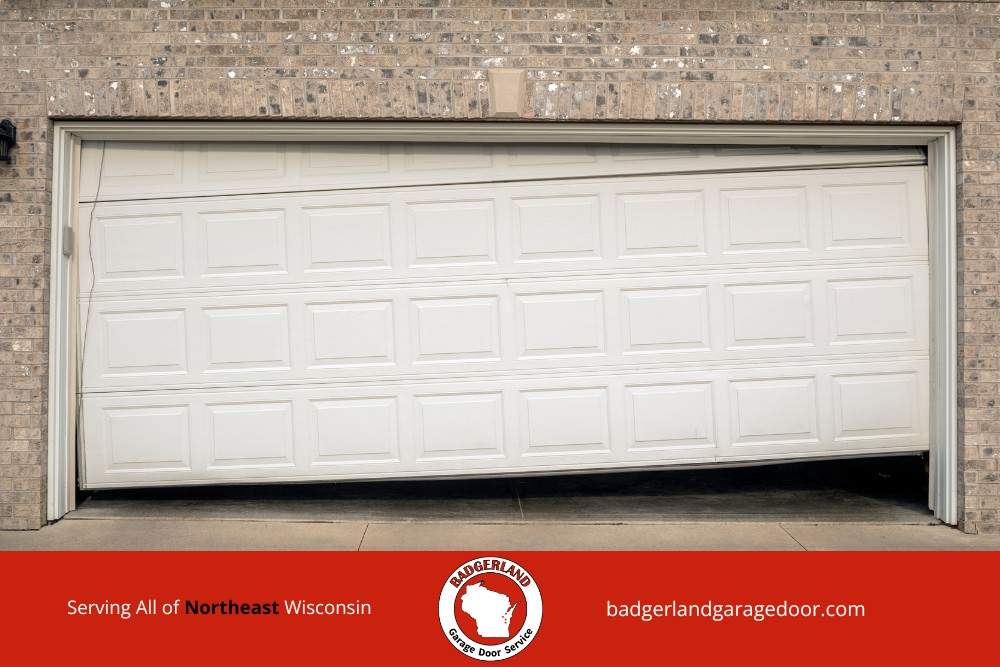
Recognizing Early Warning Signs Before a Failure
Wisconsin homeowners may notice changes caused by metal contraction, such as uneven movement, increased resistance, or audible stress noises. These issues often result from changes in linear thermal expansion and tension loss tied to negative thermal expansion effects in extreme cold.
These symptoms should never be ignored. Springs and cables hold massive amounts of stored energy, and attempting a repair without professional tools can be extremely dangerous. If you suspect your system is under strain, contact Badgerland Garage Door Service for a safety inspection. Our technicians can detect tension loss, lubrication issues, or cable wear before it becomes a full repair.
Pro Tip: Schedule a professional garage door tune-up each fall before temperatures drop. Regular lubrication and balance checks can extend the lifespan of your springs by years and prevent costly winter emergencies.
Why Preventive Maintenance Saves You Money
Routine garage door tune-ups are your best defense against winter damage. Preventive maintenance keeps your system clean, lubricated, and balanced so it operates smoothly despite fluctuating temperatures.
- Extends Component Lifespan: Proper lubrication and adjustment help springs and cables withstand the stress of freezing weather.
- Prevents Emergency Breakdowns: Detecting wear early reduces the chance of unexpected spring or cable failure during winter.
- Improves Door Balance: Tension adjustments ensure smooth movement and prevent the opener from overworking.
- Saves on Energy Costs: A well-maintained door seals tightly, keeping your garage warmer and more energy efficient.
Regular service costs less than replacing broken parts and ensures your system performs dependably through every Wisconsin winter.
How to Protect Your Springs and Cables Before Winter
To prepare your garage door system for Wisconsin’s winter, consistent care makes all the difference.
- Lubricate Moving Parts: Use a silicone-based product designed for low temperatures to keep springs, rollers, and pulleys flexible.
- Inspect Regularly: Look for rust, frayed cables, or uneven spring coils, and schedule service before issues escalate.
- Reduce Moisture Exposure: Wipe down metal surfaces and improve ventilation to prevent ice buildup.
- Check Door Balance: An unbalanced door adds stress to your system; have a technician adjust tension during a garage door tune-up.
- Schedule a Winter Inspection: A full system check includes spring tension testing, lubrication, and hardware tightening before the temperature drops.
These steps help ensure your door runs smoothly, safely, and quietly throughout the season.
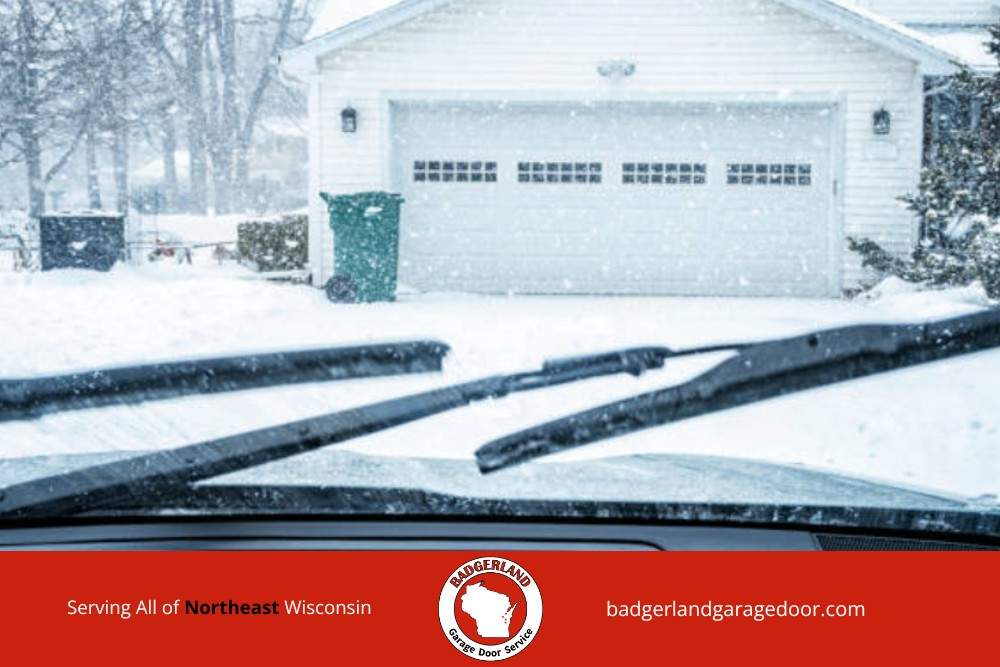
The Importance of Professional Winter Service
A broken spring impacted by metal contraction can release stored kinetic energy, creating serious safety hazards. Professional technicians understand how linear expansion coefficients and thermal expansion and contraction affect garage door systems across Wisconsin winters.
At Badgerland Garage Door Service, our winter inspections go beyond basic maintenance. We check every component, from rollers and pulleys to cables and safety sensors, ensuring your entire system is ready for freezing conditions.
Our technicians also use durable, cold-weather-rated parts that perform better in Wisconsin’s climate. Whether you need emergency service or preventive care, our team focuses on long-term safety and dependable performance so your garage door continues to operate smoothly all season.
Why Homeowners Trust Badgerland Garage Door Service
When it comes to garage door repair in Wisconsin, experience and reliability matter. Homeowners in Green Bay, Appleton, Neenah, and De Pere rely on Badgerland Garage Door Service for prompt, professional work that stands up to winter’s toughest conditions.
Our approach is straightforward. We provide honest assessments with clear pricing so you know exactly what to expect. We use high-quality, cold-weather-rated parts built for Wisconsin’s extreme temperatures. Most importantly, we deliver fast, friendly service from trained local technicians who care about your safety and comfort.
Our goal is to keep your garage door performing like new no matter how harsh the weather gets. Whether you need a tune-up, cable replacement, or spring repair, you can count on Badgerland for dependable results every time.
You can also view our Google Map listing to read verified customer reviews and see examples of our recent work across Wisconsin.
FAQs About Cold Weather Garage Door Damage
Cold temperatures cause metal to contract, which increases internal stress on garage door springs. When combined with existing wear or rust, the metal weakens and can snap under tension.
Most springs last between seven and nine years depending on usage, while cables can last slightly longer. However, harsh winters can shorten their lifespan. Annual inspections help identify problems before they lead to failure.
WD-40 is a cleaner, not a long-term lubricant. For best results, use a silicone-based or lithium-based garage door lubricant that stays effective in cold weather.
Check for ice buildup along the tracks or weatherstripping. If the door still won’t move, avoid forcing it open. A frozen spring or stiff cable could be the cause, and forcing it could make the problem worse.
A professional tune-up includes a full inspection of springs and cables, lubrication, balance testing, tension adjustment, and opener calibration to ensure safe and smooth operation during cold weather.
Keep Your Garage Door Working Smoothly This Winter
Cold weather doesn’t just affect your comfort, it affects your garage door’s performance and safety. Avoid unexpected breakdowns and costly repairs by scheduling your inspection today.
Schedule your winter inspection before cold weather leads to spring or cable damage. Call (920) 717-1657 or visit our Contact Page to book your appointment.
Stay ahead of Wisconsin’s winter and keep your door working reliably all season long.
Related Posts
See What Our Customers Have to Say About Our Service
See What Our Customers Have to Say About Our Service
REQUEST A CALLBACK
Need Repair Service or New Door?
Complete the form, and one of our team members will promptly reach out to schedule your appointment.


